Completed evaluations
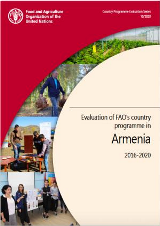
Evaluation of FAO’s country programme in Armenia 2016-2020
07/10/2020
Armenia’s agriculture represents the main economic source in rural areas and significantly contributes to the country’s GDP, employing about 30 percent of the working population. Aligned with Armenia’s national development priorities, FAO's programme has been well aligned with national priorities focusing on provision of highly specialized technical expertise towards the development of national policies, institutions, and also offering innovative approaches and solutions.
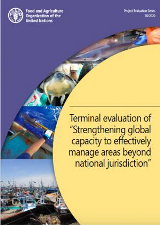
Terminal evaluation of “Strengthening global capacity to effectively manage areas beyond national jurisdiction”
06/10/2020
The marine areas beyond national jurisdiction (ABNJ) comprises 40 percent of the earth’s surface, it covers 64 percent of the surface of the ocean and 95 percent of its volume. The Common Oceans ABNJ Program (2014-2019) was implemented by FAO as a concerted effort to bring various stakeholders to work together to manage and conserve the world’s common oceans.
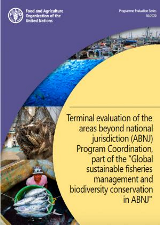
Terminal evaluation of the areas beyond national jurisdiction (ABNJ) Program Coordination, part of the “Global sustainable fisheries management and biodiversity conservation in ABNJ"
06/10/2020
The marine areas beyond national jurisdiction (ABNJ) comprises 40 percent of the earth’s surface, it covers 64 percent of the surface of the ocean and 95 percent of its volume. The Common Oceans ABNJ Program (2014-2019) was implemented by FAO as a concerted effort to bring various stakeholders to work together to manage and conserve the world’s common oceans.
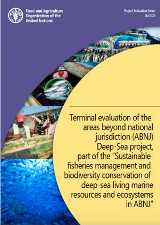
Terminal evaluation of the areas beyond national jurisdiction (ABNJ) Deep-Sea project, part of the “Sustainable fisheries management and biodiversity conservation of deep-sea living marine resources and ecosystems in ABNJ”
06/10/2020
The marine areas beyond national jurisdiction (ABNJ) comprises 40 percent of the earth’s surface, it covers 64 percent of the surface of the ocean and 95 percent of its volume. The Common Oceans ABNJ Program (2014-2019) was implemented by FAO as a concerted effort to bring various stakeholders to work together to manage and conserve the world’s common oceans.
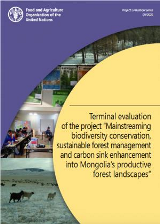
Terminal evaluation of the project “Mainstreaming biodiversity conservation, sustainable forest management and carbon sink enhancement into Mongolia’s productive forest landscapes”
24/09/2020
Forestry plays a minor but important role in the livelihoods of vulnerable populations in Mongolia. The country has developed a Participatory Sustainable Forest Management (PSFM), integrating livestock raising with forestry. The project was designed to strengthen the PSFM process, thereby improving livelihoods and the ecological status of forests.
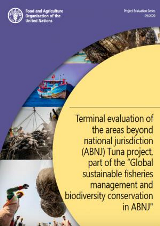
Terminal evaluation of the areas beyond national jurisdiction (ABNJ) Tuna project, part of the "Global sustainable fisheries management and biodiversity conservation in ABNJ"
24/09/2020
The ABNJ Tuna project, one component of the Common Oceans ABNJ Programme, promoted important transformational changes in the management practices of tuna fisheries, improving their sustainability, strengthening Marine Stewardship Council capabilities of tuna regional fisheries management organizations (t-RFMOs) and their members, and significantly reducing their impact on biodiversity.
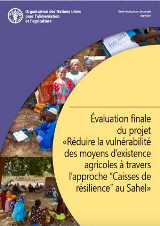
Final evaluation of the project "Reducing the vulnerability of agricultural livelihoods through the Caisses de Résilience approach in the Sahel"
15/09/2020
The overall objective of the project was to improve the food and nutritional security of vulnerable populations in Burkina Faso and Mali by strengthening the resilience of their livelihoods in the face of climatic hazards. The final evaluation of the project was carried out between April and May 2019. (French only)
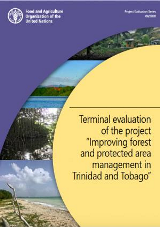
Terminal evaluation of the project “Improving forest and protected area management in Trinidad and Tobago”
14/09/2020
This report presents the main findings from the terminal evaluation of the project. The project, funded by GEF and implemented by FAO, sought to conserve globally important biodiversity and ecosystems in Trinidad and Tobago. The evaluation focuses on results achieved, it identifies the impact of the project, the sustainability of project outcomes and the degree of achievement of the outcomes in the long-term.
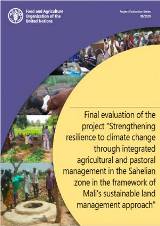
Final evaluation of the project "Strengthening resilience to climate change through integrated agricultural and pastoral management in the framework of Mali's sustainable land management approach"
14/09/2020
Mali is currently facing many challenges due to climate change which significantly affects all communities in the country, and agricultural producers in particular. In order to address these climate challenges, the project aimed to strengthen the capacities of agro-pastoralists in the districts of Banamba, Kita and Niono to help them cope with climate change. (French only)
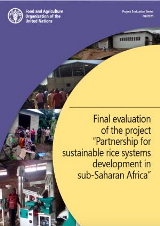
Final evaluation of the project “Partnership for sustainable rice systems development in sub-Saharan Africa”
08/09/2020
FAO implemented the project from May 2014 to December 2019, with the ten ministries of agriculture from the beneficiary countries. The project goal was to develop sustainable and productive rice systems in Africa to increase food security and enhance sustainable development of the rice food chain among smallholder farmers.
